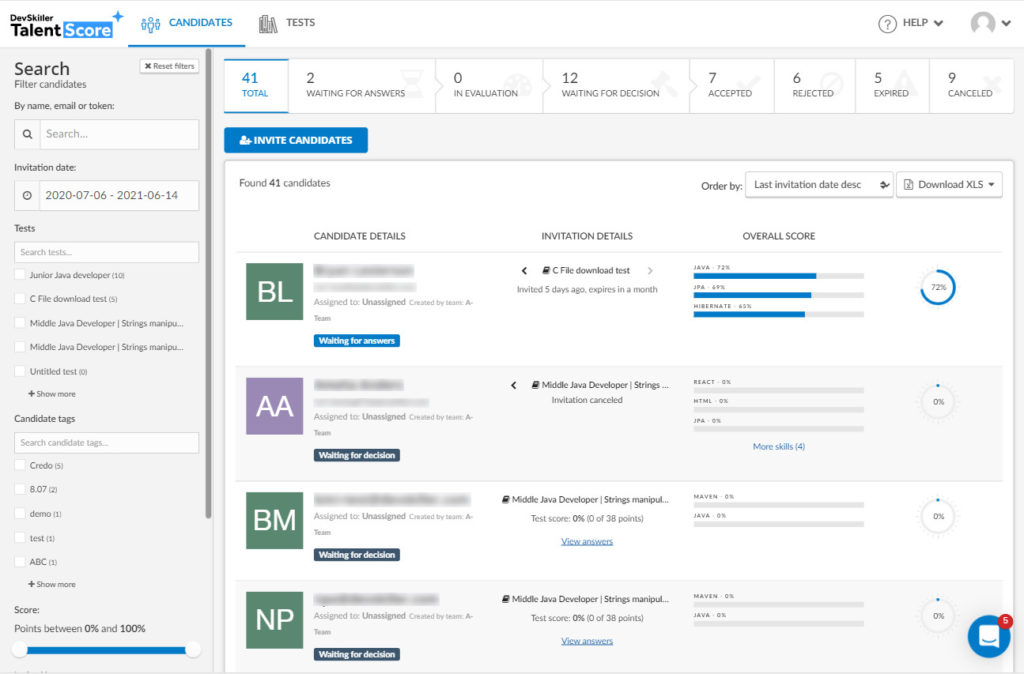
How to reduce candidate drop off rate in tech [7 tips & strategies]

According to Glassdoor, only 20% of job applicants complete the application process from start to finish. This brings the candidate drop off rate to 80%, which is rather terrifying. Considering how competitive it is to recruit developers specifically, it’s necessary to design a recruitment process in a way that is candidate friendly due to a competitive market.
In the following piece, we share the top tips to reduce your candidate drop off (or drop out) rate among IT candidates. We also shed light on why we believe technical screening interviews and tests are the way to go.
Let’s dive in.
Provide clear expectations in your job description
Making sure you have a low candidate drop out (or drop off) rate begins way before you interview your first prospective hire. Start off with crafting a clear job posting that sheds light on whom exactly you’re looking for and what the employee can expect in return.

Quelle: Unsplash
Here are a few recommendations that will help you craft an ad that attracts the right type of candidates:
- Specify the exact tech skills that are expected of the candidate. What technologies would you like the new employee to know? How advanced do they need to be in each? Also, which technologies are an absolute must, and which ones are nice to have? If you’ve ever run a skills inventory for your tech team, you’ll have a clear view of the technologies a talented candidate will acquire or improve on the job through working with other team members.
- Transparent salary. According to a Stack Overflow study of over 65,000 developers, better compensation is the #1 job hunt factor among the tech community (standing at 70%). Needless to say, if you were wondering whether it makes sense to display the salary in your job description, the answer is yes! After all, the last thing you want is to spend time and resources on interviewing a candidate, who’ll be out the door as soon as you reveal the expected remuneration.
- Keep your job description short, to make it look good on mobile devices. While the sweet spot is anywhere between 200 and 600 words, 200-300 is the absolute best!
- Make sure your communication style reflects your company culture. Your job posting is a great opportunity to give the prospect a sense of who you are as a team. This can be achieved by using a fitting tone of voice – for example, laid-back or formal.
- Mention the work mode. Is your company remote-first? As many candidates seek flexible arrangements, specify whether you expect the candidate to work from an office after the pandemic has come to an end.
- Explain the steps of the recruitment journey. Will it take seven steps for the candidate to receive an offer, or just three? Not all candidates are willing to go through a lengthy procedure, so it’s best to let them know upfront. If you can let them know how long until they hear from you once they apply, it’d be optimal. We discuss designing the recruitment process in the next point.
- Career path opportunities. Lastly, what are the potential skills progression paths? If you know you’re looking for someone who’ll eventually take over as team lead, mention it in your job post. Demonstrate the transitions and upskilling steps necessary to get promoted already at the recruitment stage. This will create a positive experience for the candidate as they know exactly how they can grow when they join.

Quelle: Unsplash
Design a process that is optimized for tech candidates
After you’ve put in the effort to bring the right candidates’ attention to your ad, it’s time to optimize your hiring process for the lowest possible drop off rate. Though it might seem obvious, make sure that it’s easy and quick to apply in the first place. If you can keep the time needed for the application under 5 minutes, you’re looking at a 350% increase in apply rates, as opposed to a process that takes more than 15 minutes.
What should happen next? We highly recommend using a solution like TalentScore, which lets you automatically test your candidate and emulate a real-life task expected for the role. All this happens even before your recruiters schedule any interviews. We shed more light on this below.
Test technical skills fast, effectively
In order to find suitable candidates, and reduce drop out (or drop off) rate, it’s recommended to test applicants’ tech skills early in the recruitment process. Consider using work sample tests that are reflective of the role, instead of investing in whiteboards or riddles. Your candidates will get access to resources they’d normally have at hand while working for you. This will help to emulate the work environment they’d be exposed to if they got the job.
The entire testing process can be automated if you use a platform like DevSkiller TalentScore. Not only will all the tests be marked automatically, but you’ll also be able to quickly filter out the best candidates and invite them to technical screening interviews. Evaluating tech skills first has a positive impact on reducing drop off rate because the process is shorter. Aliz, a Big Data and Machine Learning specialized Google Partner is just one example of it – by using DevSkiller they’ve managed to cut their drop off rate by 1.5 times.

Quelle: TalentScore
Effective technical screening will help you achieve two things:
- Objectively verify candidates tech skills prior to inviting them to tech screen interviews, saving your and your co-workers time
- Give the candidates the freedom to decide where and when they take the test, which they will greatly appreciate.
Maintain constant communication with tech candidates
Did you know that 53.5% of candidates get no feedback after being interviewed? Applying for jobs is stressful, and the way you communicate with candidates will impact their perception of you, and might contribute to their offer decision. It’s good practice to keep all applicants informed about their progress in the recruitment process, even the unsuccessful ones – knowing where they stand will significantly reduce stress.
Try to answer their questions if they have any – regular communication will make your candidates feel looked after. And since it’s rarely the case that people apply for one job only, if you make a good impression, they might select you over competitors. This leads to the next point below.
Provide timely feedback
It is in good taste to follow up with your candidate quickly after each stage of the recruitment process. One of the most common mistakes is making your unsuccessful applicants wait for days or even weeks to hear back from you. In the worst-case scenario, they don’t receive feedback altogether, which can be a source of bad recruitment PR for your brand.
Remember that each and every individual has dedicated their time to apply for the job. What you can do in return, is provide them with a reason for why they’ve been eliminated from the recruitment process, and actionable feedback so they can make improvements (if they ask for it). This way, you’ll make sure they retain a good perception of you and don’t encourage any other potential candidates to drop off.

Quelle: Unsplash
Build a strong employer brand
In tech, a strong employer brand is a must as candidates have numerous opportunities to choose from. Make sure your reputation across social media and work-related platforms such as Glassdoor is stellar. Remember that high agitation and strong negative emotions like anger are a big driver of why people share content across social media.
Sadly, what this means for you is that your disgruntled candidates are more likely to share their feedback on your hiring process with the rest of the world than those who enjoyed the process.
Building a strong employer brand is truly crucial to keep your reputation intact.
Another way to build a strong employer brand is to encourage your developers to showcase their work and achievements, as well as take part in industry events. What is more, your candidates who see the activity of your tech team on development-related platforms like Stack Overflow or Github are more likely to trust you and follow through with their application.
Create a great candidate experience
Finally, aim to create a superb experience for your candidates. As we’ve discussed above, make sure to build trust early on in the application process, help the candidate see you as an attractive employer, and put an emphasis on transparency and communication.

Quelle: Unsplash
Summary
There are many reasons why a high candidate drop off rate can have a detrimental effect on your company. Firstly, your recruiters put in a lot of time and effort in tech screen interviews, only to see candidates drop out halfway through. This not only makes it harder to fill the role but might also negatively impact your recruiter’s engagement and job satisfaction. Secondly, without the right recruitment process in place, your company risks spending a lot of money on candidate sourcing methods that fail to deliver results.
What’s the solution?
For starters, make sure to follow the right practices. These include crafting a clear job description, providing timely and accurate candidate feedback, and – overall – shortening the entire recruitment process. We recommend using a technical screening solution like TalentScore to make sure you keep the process quick and convenient for the candidates. Our solution has proven to increase candidate retention rates – for instance, previously-mentioned big data company Aliz has seen a 1.5x increase in candidates staying in the pipeline after they’ve implemented our tech screening software.
By running DevSkiller’s work sample coding tests, you’ll be able to emulate real-life job tasks and your environment, reduce the interview process, and keep candidate drop off rates under control.
Good luck with your hiring!
Image credit: Unsplash




